MRS. DOUBTFIRE (1993)
After a bitter divorce, an actor disguises himself as a female housekeeper to spend time with his children held in custody by his former wife.
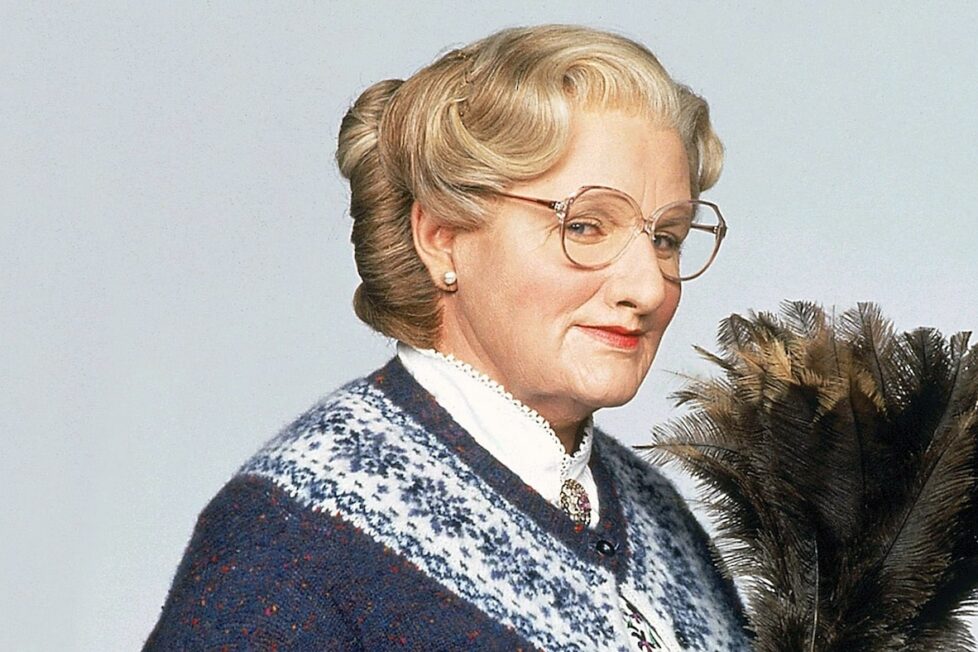
After a bitter divorce, an actor disguises himself as a female housekeeper to spend time with his children held in custody by his former wife.


She’s the perfect nanny. A culinary wizard, a domestic goddess, and a confidante to your children; she feels like someone you’ve known your whole life, someone you can trust with your deepest secrets. But beneath the veneer of perfection lies a secret, a hidden reality that you’d be foolish to ignore.
Daniel (Robin Williams) and Miranda Hillard (Sally Fields) are in the throes of a contentious divorce. Exasperated by Daniel’s flippancy, impulsiveness, and chronic job-hopping, Miranda takes legal action and secures sole custody of their children. For Daniel, a life without his beloved offspring is like a death sentence—one he refuses to accept.
Driven by a desperate longing to remain an integral part of his children’s lives, Daniel devises an elaborate scheme: to be invited into his former home incognito, by deceiving everyone around him and become an integral part of the family as an old Scottish nanny. Unsurprisingly, his covert operation triggers a cascade of unforeseen complications.
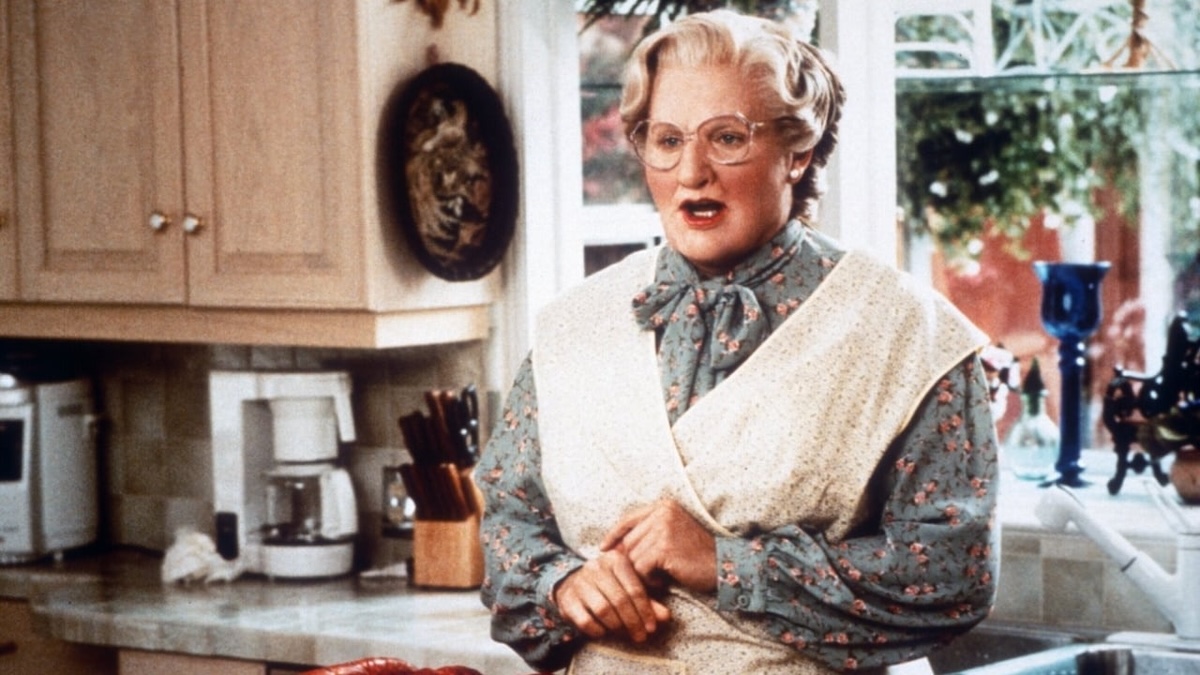
At times, Mrs. Doubtfire (adapting the 1987 novel Madame Doubtfire by Anne Fine) is genuinely disturbing. It’s a bit like Marriage Story (2019) only with a quirky home invasion plotline and a manipulative, conniving protagonist. In other moments, the movie becomes excessively sentimental, which could have led to a strange, unbalanced work. However, despite some jarring tonal shifts, the film’s underlying message, expertly conveyed by Williams’ electrifying performance, manages to keep the entire enterprise afloat. Ultimately, this results in a movie that endures despite its flaws.
From the moment Daniel appears on screen, his eccentric personality radiates – it’s obvious that he would make for an endlessly amusing father. His operatic Italian singing skills are matched only by his impeccable mimicry, making his job of voicing cartoon animals a cinch. For a child in 1993, before the captivating allure of iPhones, having a father like Daniel in the house would be a dream come true. His fun-loving spirit, cheeky banter, and laid-back demeanour would make him the ultimate childhood companion.
However, it’s for the exact same reasons that he is a deeply frustrating partner. His insouciant approach to parenting frequently renders Miranda apoplectic: she’s forced to be the sole adult in any situation, unjustly, causing her to be branded as the villain. It’s clear that Daniel’s immaturity extends to his professional life as well; in only the first scene, he quits his job due to very minor moral qualms. Undoubtedly, having an impetuous partner like Daniel—who demonstrates a total disregard for rules, but indignance when met with the consequences of his actions—would prove to be grating.
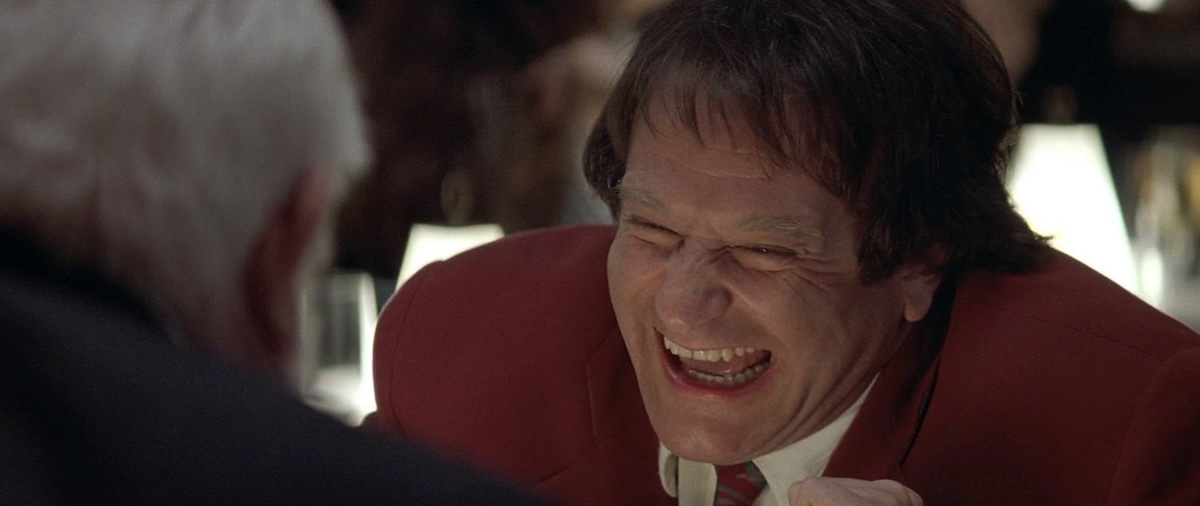
At the heart of Miranda’s frustration with Daniel lies his impulsiveness, recklessness, and inconsiderate nature. Her assessment is spot-on, as Daniel’s childish behaviour seems to aggravate everyone he meets. His lack of forethought is evident in the film’s very premise: his subterfuge is successful, but as a long-term plan, what was his objective? Remain in the house as Mrs. Doubtfire forever, or disappear mysteriously? Of course, if we start scrutinising such questions too closely, the film would never have been made; a certain degree of suspension of disbelief is necessary.
Nevertheless, while we might be able to overlook dubious aspects of the plot for the sake of entertainment, some things cannot be ignored. Much of Daniel’s behaviours is undeniably problematic; though his actions are often played for laughs or romanticised as the daring exploits of a devoted father, they raise serious ethical concerns. In fact, a bizarre, perverse enjoyment can be had when you realise that many of us watched this movie as children without fully grasping the unscrupulous nature of our protagonist.
From under a few centimetres of latex, Daniel engages in a pattern of gaslighting, manipulating Miranda to feel ashamed of her sexual appetite, her fashion choices, and her career aspirations. Daniel’s increasingly bold attempts to sabotage her budding relationship with Stu (Pierce Brosnan) reveal a toxic streak that goes beyond mere jealousy. It’s not about getting closer to his children: it’s about asserting control and placating his own insecurities.
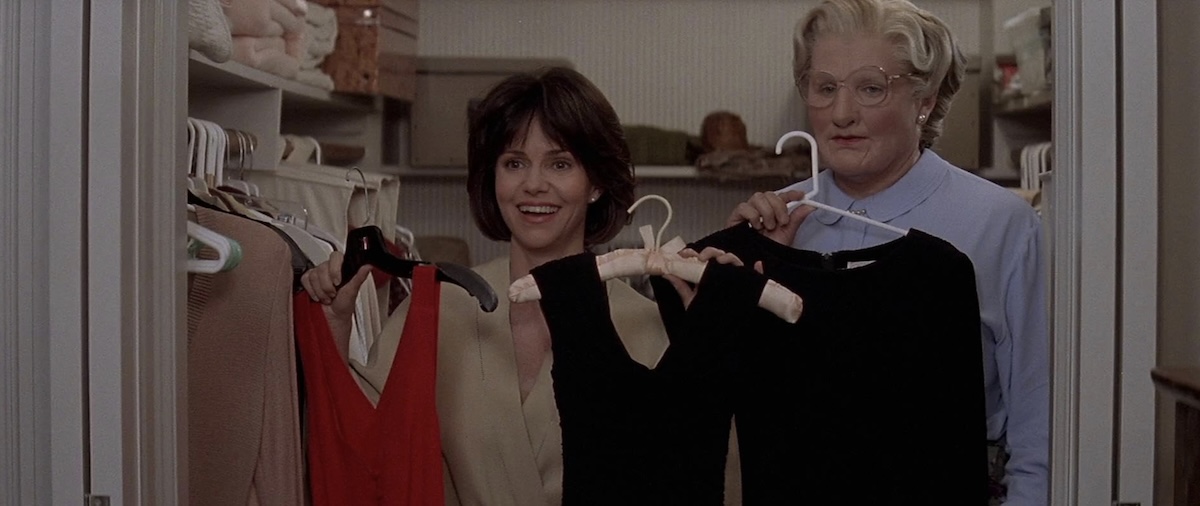
While we might chuckle at his cunning tactics, certain scenes would undoubtedly elicit gasps instead of laughs if presented in a more serious tone. Daniel’s behaviour isn’t merely misguided or comedically Machiavellian; it borders on sociopathic. His actions highlight the importance of recognising and addressing emotional manipulation, even when it’s done for laughs.
But there are plenty of laughs. The film is brimming with humour, with a barrage of puns, double entendres, and innuendos too numerous to count. One particularly memorable moment involves Mrs Doubtfire drunkenly attempting to retrieve her false teeth from her wine glass, proclaiming “Carpe dentum—seize the teeth.” This clever pun not only serves as a humorous aside but offers a subtle nod to one of Williams’ most celebrated roles in Dead Poets Society (1989). It’s highly likely Williams himself ad-libbed many of these puns, adding to the film’s spontaneous and improvisational feel.
Perhaps wisely, the film refrains from delving into the social commentary on gender dynamics that characterised its predecessor, Tootsie (1982). While it does offer a few predictable gags inherent in the cross-dressing premise (such as Daniel unintentionally bewitching an elderly bus driver), these moments remain superficial and don’t extend beyond brief scenes. In contrast, both Tootsie and the classic Some Like It Hot (1959) tackled the complexities of male-female interactions with greater depth and acuity, demonstrating how our behaviour towards the opposite sex is often enforced by societal norms. Dustin Hoffman’s Michael Dorsey is forced to confront the harsh realities of how he’s viewed women after experiencing the objectifying gaze of men like himself. Similarly, Jack Lemmon’s Jerry is compelled to re-evaluate his treatment of potential lovers when he undergoes the ordeal of Osgood Fielding’s courtship rituals.
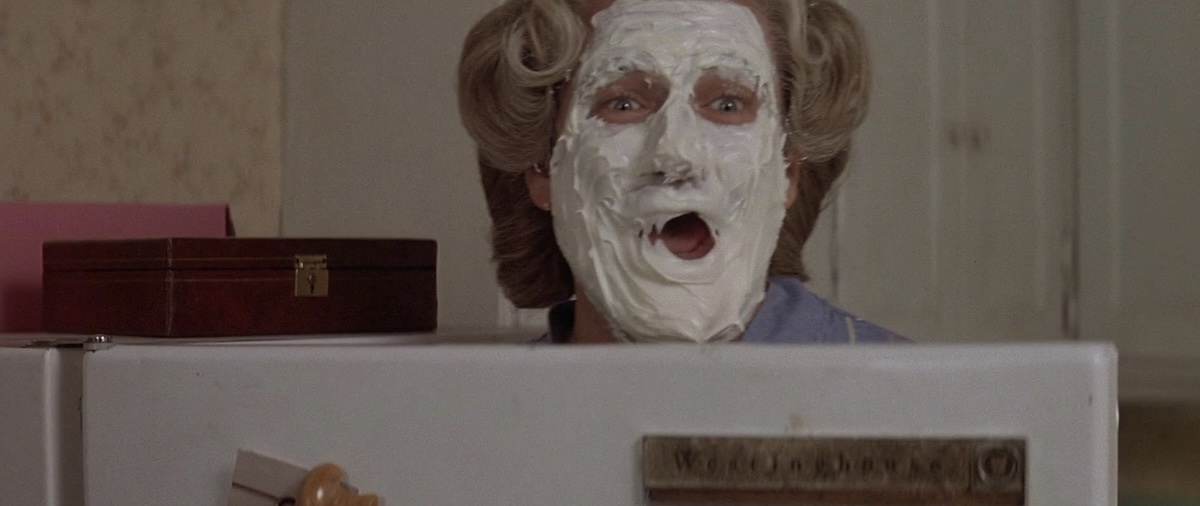
While these films share a similar premise, they differ in their execution and thematic depth. Robin Williams is portraying the opposite sex, but it isn’t relevant thematically; it serves merely as a plot device. The humour isn’t to be found in witty, insightful commentary on male-female relations, but in Daniel’s farcical attempts at avoiding exposure. Couple this with Williams having to portray two people at once under stressful circumstances and numerous gags ensue. A subtle distinction, but one that more keenly appeals to a family-friendly audience.
While Mrs. Doubtfire falls comfortably within the realm of family-friendly comedies, it’s far from superficial. Though it may seem like an exaggerated claim, Mrs. Doubtfire was a significant film of the 1990s. With its staggering box office gross of over $450M, it brought to the forefront the crucial role of father figures in a child’s life. Through Williams’ endearing portrayal, Mrs. Doubtfire challenges the traditional stereotypes of fathers as stern disciplinarians or detached providers. The story showcases how compassionate, loving fathers are often separated from their children during divorce, mostly due to outdated conceptions of what a dad is and should be.
While the film successfully balances humour and heart, director Chris Columbus occasionally dips into overly sentimental territory, especially when dealing with the inimitable Robin Williams. This tendency, while not entirely unbearable, does hint at the syrupy excesses of their later collaboration, Bicentennial Man (1999). But despite these occasional forays into melodrama, Mrs. Doubtfire still delivers moments of genuine emotion. Daniel’s heartfelt plea to the judge at the film’s climax is truly gut-wrenching, and Mrs Doubtfire’s televised address to children navigating the turmoil of parental separation is deeply moving, too.
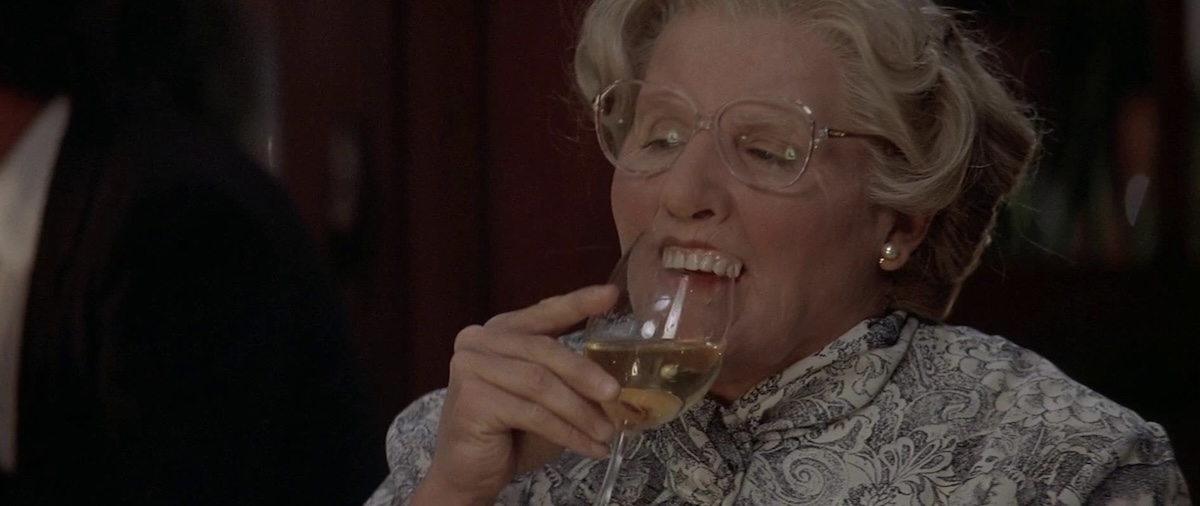
Howard Shore’s music also elevates the story’s poignant moments. It masterfully amplifies the characters’ inner turmoil without becoming excessively maudlin. When the mood shifts back to being upbeat and fun, the carefully curated tracks—many of which manage to be both uplifting and puns—create an infectiously enjoyable soundtrack. Aerosmith’s “Dude (Looks Like a Lady)”, The Four Seasons’ “Walk Like a Man”, and Frank Sinatra’s “Luck Be a Lady” all maintain thematic relevance while striking a perfect tonal balance. Particularly, pairing Sinatra’s crooning with Daniel’s makeover sequence was a fantastic choice.
Suffice it to say this movie isn’t without its problems. It certainly isn’t perfect. In fact, it’s a little bizarre when you look at it on paper. However, Williams’ performance and Columbus’ ability to capture magic ameliorate Mrs. Doubtfire into a classic, and not the misfire it could’ve been. Though it excels as a screwball comedy, the believable showings from everyone on screen ensure that it’s not solely a silly film. Surprisingly, Mrs. Doubtfire still packs an unexpected emotional wallop, deftly handling dramatic moments to create a realistic portrayal of familial strife.
If we can overlook a lot of Daniel’s troubling, toxic behaviour, then the film can still be enjoyed for what it is: a story about an imperfect man who just loves his kids to bits. It remains an amusing portrayal of the places our emotions will take us if we let them, as well as the trouble we might find ourselves in when our reason has long since abandoned us. For Daniel, this entails getting hammered on four double whiskeys while masquerading as a Scottish sexagenarian.
Such are the follies of love.
USA | 1993 | 125 MINUTES | 2.39:1 | COLOUR | ENGLISH

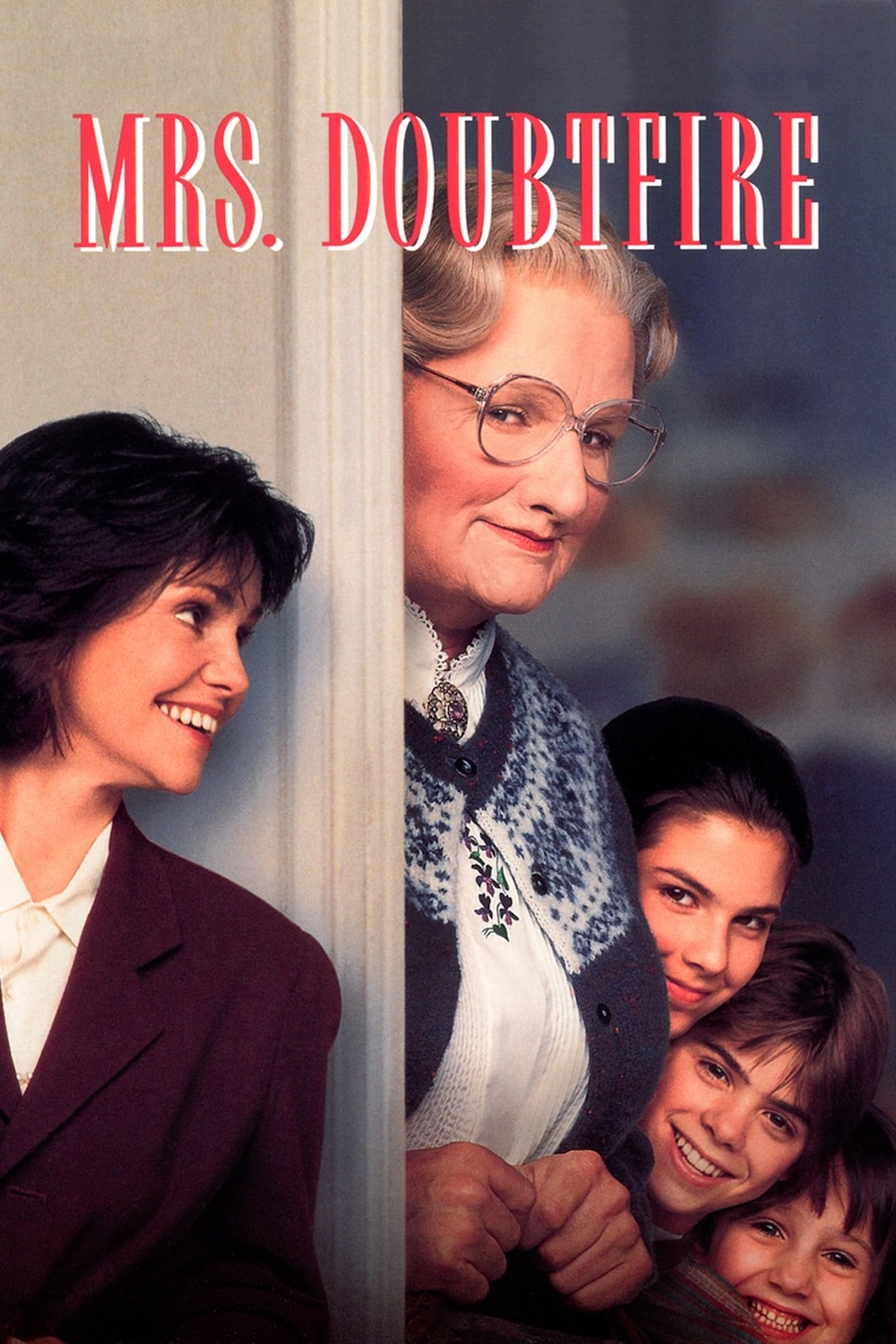
director: Chris Columbus.
writers: Randi Mayem Singer & Leslie Dixon (based on ‘Madame Doubtfire’ by Anne Fine).
starring: Robin Williams, Sally Field, Pierce Brosnan, Harvey Fierstein & Robert Prosky.
